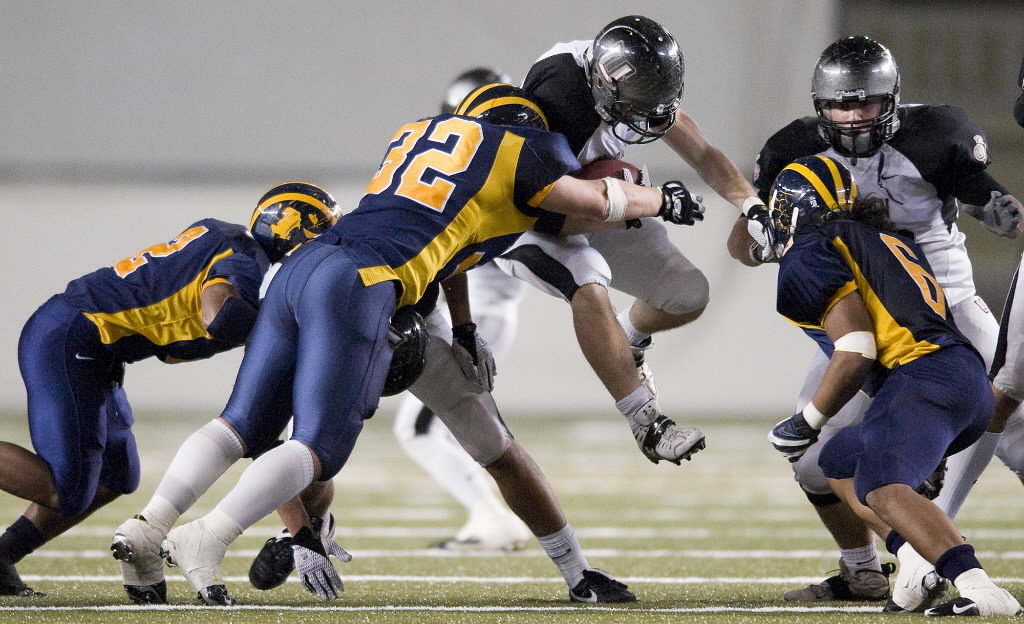The reaction to the sanctions handed down by the KingCo Conference athletic directors onto the Bellevue football program falls into three distinct categories.
In the first, embraced by most people outside of Bellevue, goes something like “Good. Bellevue has been cheating for years. It’s about time somebody threw the book at them.”
The second reaction generally comes from folks in Bellevue and it goes “This entire investigation was a hatchet job from the outset and the resulting sanctions are unjust as they are based on unsubstantiated claims unsupported by physical evidence.”
The third reaction goes something like “Yeah, we suspected something was going on at Bellevue, and something needs to be done to fix it. But just don’t punish the kids.”
It’s this third reaction that I wanted to discuss.
While I believe the folks expressing this sentiment are well-intentioned, I’m not sure they understand the purpose of the sanctions.
The goal of the sanctions is twofold — to punish those people responsible, and to ensure the violations do not occur again, either at the offending school or anywhere else.
The second objective is the more important one. And it is very difficult to achieve without impacting current or future players of the program. That’s just the way it is.
If you could go after the coach, force him out — which in this case the Bellevue School District looked prepared to do before a recent change of heart — or suspend him from coaching.
But that seems a bit like too-little-too-late. In this case, Bellevue has already won 11 state championships from 2001-2013. Coach Butch Goncharoff received more than a $500,000 — that’s a half million — from the Bellevue booster club over the past decade, and it was recently reported that the Bellevue School District had paid $175,000 over the past 16 years for jerseys, T-shirts and other apparel from a printing company owned by Goncharoff.
Coaching football has never been Goncharoff’s primary source of income, so losing that job wouldn’t hurt him much financially. Plus, I’m told he can make a lucrative income from simply organizing summer youth football camps.
You could go after the booster club by disbanding it or discontinue its connection with the football program.
But here’s the thing about money — and that’s at the center of the issue surrounding this program, money — it can always find its way to leak through cracks in the system. And without an organization behind the money, it can be very difficult to track.
Remove temptation
In the end, if you want violations to stop, you have to take away what it was the violators were trying to achieve.
The goal originally at Bellevue was to win state championships. But then the Wolverines won 11 state titles in 13 years, beating state-tournament opponents in those championship years by an average margin of 36-9.
So the Wolverines looked for challenges outside the state, playing non-league games against high-profile programs from California to Texas, boosting their national recognition and ranking.
When the KingCo proposed banning Bellevue from the postseason for four years and prohibited the Wolverines from playing non-league games for two years and out-of-state opponents for four years, that’s the carrot they were trying to take away.
But critics have asked if these sanctions weren’t hurting the kids.
Well, are they?
What’s to play for?
Here is what students at Bellevue still could do even with those sanctions.
• They can play football as an extracurricular activity at their school.
• They can represent their school.
• They can build friendships among teammates and opponents.
• They can create a lifetime of memories.
• They can position themselves to draw the attention of college coaches.
That notion might seem a little touchy-feely to some. But it is what many — if not most — players take away from their high school football experience.
Take a look at the 17 schools that currently play in the 4A, 3A or 2A Greater St. Helens Leagues.
Over the past 10 years, seven of those schools have never advanced their football team to the state playoffs. I’m not talking about the Week 10 district or quad-district playoffs. I’m talking the 16-team state tournament.
One of the teams that has made it to state in the past decade — Battle Ground — did so just this past year for the first time in 36 years. Another — Woodland — has not made it as a 2A school.
So we’re talking about more than half the players of high school football in Southwest Washington over the past decade who never got a chance to go to state. Were they cheated out of their high school football experience? Were they able to achieve all those bullet points listed previously?
Several players on teams that never made it to state went on to have successful careers in college football. One player made it all the way to the NFL.
I would say at least a third — if not half — of the teams in the state enter this season knowing that making the state playoffs is a longshot at best. And yet they still play the game.
Why? Because it’s about more than hoisting a trophy in December and the win-at-all-cost mentality that often comes with that. Perhaps that’s what is needed in this case — a little dose of perspective.
Position of advantage
And most importantly, if you believe that Bellevue put itself in a position of advantage by breaking the rules and thumbing its nose at the notion of sportsmanship and fair play so highly touted by the WIAA, then simply removing the coach or disbanding the booster club won’t remove Bellevue from its position of advantage.
It’s like discovering the reason why a runner keeps winning races is that his coach kept giving him a head start, then getting rid of the coach while still allowing the kid to have the head start. Who is being punished in that scenario? The runner? The coach? The runner’s competitors?
If the WIAA finds Bellevue guilty of these violations, it will agree with the sanctions handed down by the KingCo and bring the Wolverines back to a level playing field with its competitors.
Tim Martinez is the assistant sports editor for The Columbian. He can be reached at 360-735-4538, tim.martinez@columbian.com or follow his Twitter handle @360TMart.





